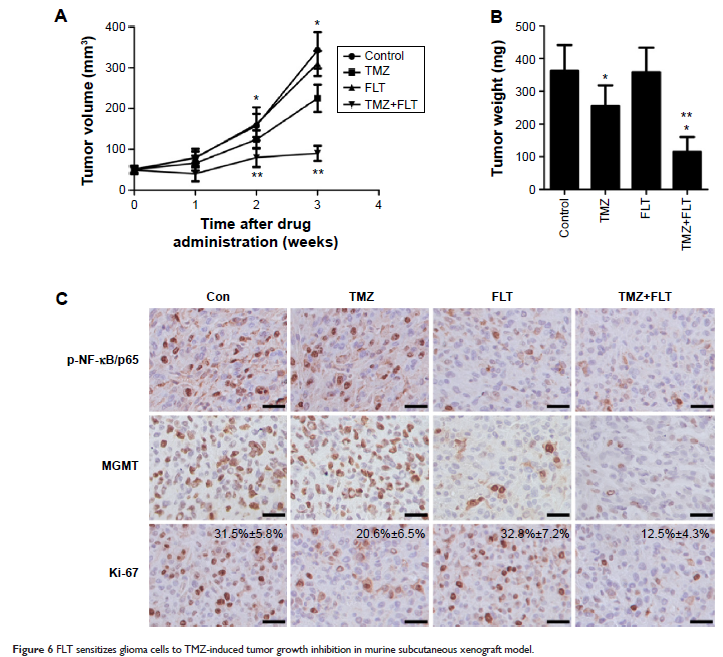9 0 5 7 8
论文已发表
注册即可获取德孚的最新动态
IF 收录期刊
- 2.6 Breast Cancer (Dove Med Press)
- 3.9 Clin Epidemiol
- 3.3 Cancer Manag Res
- 3.9 Infect Drug Resist
- 3.6 Clin Interv Aging
- 4.8 Drug Des Dev Ther
- 2.8 Int J Chronic Obstr
- 8.0 Int J Nanomed
- 2.3 Int J Women's Health
- 3.2 Neuropsych Dis Treat
- 4.0 OncoTargets Ther
- 2.2 Patient Prefer Adher
- 2.8 Ther Clin Risk Manag
- 2.7 J Pain Res
- 3.3 Diabet Metab Synd Ob
- 4.3 Psychol Res Behav Ma
- 3.4 Nat Sci Sleep
- 1.9 Pharmgenomics Pers Med
- 3.5 Risk Manag Healthc Policy
- 4.5 J Inflamm Res
- 2.3 Int J Gen Med
- 4.1 J Hepatocell Carcinoma
- 3.2 J Asthma Allergy
- 2.3 Clin Cosmet Investig Dermatol
- 3.3 J Multidiscip Healthc

由氟西汀 (Fluoxetine) 导致的 NF- κB 信号中断会使 MGMT 在胶质瘤细胞中的表达减弱
Authors Song T, Li H, Tian Z, Xu C, Liu J, Guo Y
Received 2 April 2015
Accepted for publication 18 June 2015
Published 20 August 2015 Volume 2015:8 Pages 2199—2208
DOI http://dx.doi.org/10.2147/OTT.S85948
Checked for plagiarism Yes
Review by Single-blind
Peer reviewer comments 3
Editor who approved publication: Dr Faris Farassati
Background: Resistance to temozolomide (TMZ) in glioma is modulated by the DNA repair protein O6-methylguanine-DNA methyltransferase (MGMT). This study aimed to examine the effects of fluoxetine (FLT) on MGMT expression in glioma cells and to investigate its underlying mechanisms.
Materials and methods: Expression of MGMT, GluR1, or IκB kinase β (IKKβ) was attenuated using short hairpin RNA-mediated gene knockdown. The 3-(4,5-dimethylthiazol-2-yl)-2,5-diphenyltetrazolium bromide (MTT) assay was used to evaluate the growth inhibition induced by FLT or TMZ. Terminal deoxynucleotidyl transferase deoxyuridine triphosphate nick end labeling (TUNEL) was conducted to detect apoptotic cells. Western blotting was conducted to analyze the protein expression of MGMT, IKKβ, and NF-κB/p65 following FLT treatment. The murine subcutaneous xenograft model was used to evaluate the combinational effect of TMZ and FLT.
Results: FLT markedly reduced MGMT expression in glioma cells, which was independent of GluR1 receptor function. Further, FLT disrupted NF-κB/p65 signaling in glioma cells and consequently attenuated NF-κB/p65 activity in regulating MGMT expression. Importantly, FLT sensitized MGMT-expressing glioma cells to TMZ, as FLT enhanced TMZ’s ability to impair the in vitro tumorigenic potential and to induce apoptosis in glioma cells. Knockdown of MGMT or IKKβ expression abolished the synergistic effect of FLT with TMZ in glioma cells, which suggested that FLT might sensitize glioma cells to TMZ through down-regulation of MGMT expression. Consistently, TMZ combined with FLT markedly attenuated NF-κB/p65 activity, reduced MGMT expression, and suppressed in vivo tumor growth in the murine subcutaneous xenograft model.
Conclusion: Our findings demonstrated that FLT attenuated MGMT expression by disrupting NF-κB signaling and sensitized glioma cells to TMZ, which may warrant further investigation toward possible clinical application in MGMT-expressing glioma.
Keywords: glioma, fluoxetine, MGMT
